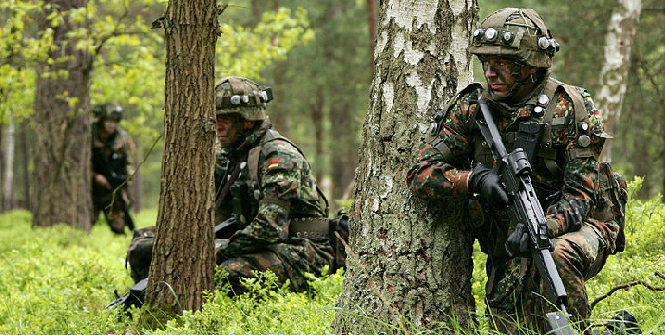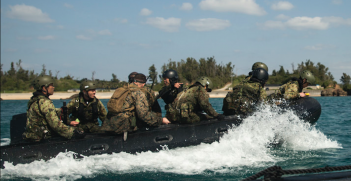Germany and Europe’s Security: Normalisation is Overdue

Germany has gradually assumed an increasing share of European leadership in recent years. Now it needs to take more responsibility for the Continent’s security.
Europe’s post-Cold War order feels increasingly under siege. The embers of the Eurozone crisis still smoulder quietly in Greece, and its fallout stifles economic growth and employment across the bloc. The Schengen Agreement – perhaps the greatest symbol of European integration – is buckling under the weight of the refugee crisis. Equally worrisome are the rising threats to Europe’s security on its southern and eastern periphery. Putin’s Russia is probing NATO’s commitment to its eastern fringe and the band of instability stretching from Libya to Iraq spills refugees and even terrorists onto the continent.
The past six years have seen Germany take an unprecedented leadership role within the European Union (EU). In the European debt crisis, Germany – as the Eurozone’s richest country – directed the bloc towards a policy of austerity and contributed enormous sums to preserve the common currency area. While Grexit is still possible, the rest of the currency union appears stable. Likewise in the ongoing refugee crisis Germany has taken a stand for “Europe” – it has accepted more refugees than any other EU member and is fighting to uphold Europe’s commitment to humanitarian values.
Germany did not gladly take up its new role in Europe. The memory of World War II still lingers in the minds of Europeans and Germany has been frequently confronted with Nazi comparisons in response to its assertive debt crisis politics. The country’s militarist past is in fact the greatest barrier to Germany embracing its natural position as the bulwark of European security.
Germany needs to normalise its military paradigm for the sake of Europe’s security. In an era where the United States is refocusing its energies on the Asia-Pacific, Europe needs to be able to provide more of its own security. In the absence of a European army, this means cooperation through NATO. It was through NATO that Europe addressed human rights abuses in Bosnia, Yugoslavia and Libya. It is the umbilical cord that links Europe’s security to that of America. Its umbrella gives Europe the shelter it needs to focus inward on the European project – the project that postwar Germany so deeply cherishes.
Despite NATO’s vital contribution to European security, the Continent’s share of alliance spending has steadily declined in recent years in tandem with its military capacity. In the 2011 Libya intervention, European jets ran short of precision munitions while merely imposing a no-fly zone against an ill-equipped enemy. Germany did not even participate. If it had, its dilapidated air force might not have done much good. In December 2015 a Bundeswehr report showed that only 50 percent of the Luftwaffe’s available weapons systems are ready for deployment. This also suggests that even if Germany desired to take part in combat operations against groups like Islamic State – which it does not – its armed forces would be hard-pressed to do so. Its modest deployment of six reconnaissance aircraft in Syria is currently grounded for nighttime missions because the pilots’ night vision goggles are blinded by the cockpit’s LED illumination. Such basic ineptitude is by no means an isolated occurrence: the Bundeswehr’s standard combat rifle has been found to be inaccurate at high temperatures and its primary transport aircraft often suffer breakdowns. Germany’s military is decrepit and rarely provides more than token support for allied operations.
This constitutes a gaping hole at the heart of NATO-Europe.
This should not be the case: Germany boasts the EU’s largest economy and population and has a strong arms industry. Its powerful economy could certainly provide enough tax revenue to fund a thoroughgoing military upgrade. The missing factors are public and political will.
Historical aversion to war meant that Germany completely abstained from military intervention until the Balkan wars in the 1990s. Even then the country’s limited participation was deeply controversial. Today, Berlin’s modest efforts towards military normalisation are still outpacing public opinion. In 2014 Defence Minister Ursula von der Leyen stated that Germany should ‘enhance [its] international responsibility’ for peace and stability in the world. However, a poll the next year found that only 25 percent of Germans support such a policy. Even more worrisome is the public’s view of NATO. Support for the alliance sank 18 percentage points between 2009 and 2015 and today only 38 percent of Germans would favour militarily defending a NATO ally if attacked by Russia. This is alarming, and not only for the Baltic: NATO is the glue that binds Europe’s security order together. If the alliance failed to respond to Russian hybrid warfare aggression against a member state, it could conceivably fall apart. If this happened, other eastern EU states would be vulnerable to coercion by Moscow.
The best that can be hoped for the German military is a modernisation drive. In March 2015 the government announced a 4 percent increase in defence spending for 2016, which is meant to address some of the military’s glaring deficiencies and contribute to ‘widened NATO engagement’. This engagement includes participation in the “Spearhead Force,” a rapid-reaction unit created in response to Russian aggression in the Ukraine. Yet this relatively small force is not permanently based in the Baltic states, which are the NATO members thought to be most at risk. 74 percent of Germans oppose stationing such a force in the Baltic. The fact that the alliance is not basing troops there signals a lack of resolve to its eastern members and to Russia.
Germany needs to take a more leading role within the alliance – just as it has done in the debt and refugee crises – and lobby for a more credible NATO posture. But this would require public support and a capable military, both of which the country lacks. Germany has not yet awoken from its dream of the post-Cold War peace dividend. It needs to.
Roman J. Madaus is a Master’s student at the Strategic and Defence Studies Centre, Coral Bell of Asia Pacific Affairs, Australian National University and a current intern at the Australian Institute of International Affairs’ National Office. He underwent basic training with the Bundeswehr in 2011. This article can be republished with attribution under a Creative Commons Licence.





